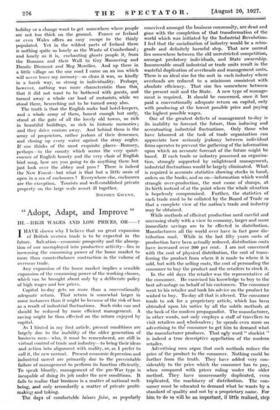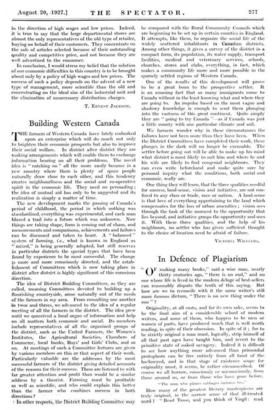" Adopt, Adapt, and Improve "
III.—HIGH WAGES AND LOW PRICES, OR ?
IHAVE shown why I believe that no great expansion of British oversea trade is to be expected in the future. Salvation—economic prosperity and the absorp- tion of our unemployed into productive activity—lies in increasing the consuming power of the home market to more than counterbalance contraction in the volume of overseas trade.
Any expansion of the home market implies a sensible expansion of the consuming power of the working classes, which can be brought about only by a deliberate policy of high wages and low prices.
Capital to-day gets no more than a conventionally adequate return. That return is somewhat larger in some instances than it might be because of the risk of loss as a result of industrial fluctuations. Such risks can and should be reduced by more efficient management. A saving might be thus effected on the return enjoyed by capital.
As I hinted in my first article, present conditions are largely due to the inability of the older generation of business men--who, it must be remembered, are still in virtual control of trade and industry—to bring their ideas and action into alignment with reality, or, as I prefer to call it, the new normal. Present economic depression and industrial unrest are primarily due to the preventable failure of management to perform its function efficiently. To speak bluntly, management of the pre-War type is incapable of doing its job under the new conditions. It fails to realise that business is a matter of national well- being, And only secondarily a matter of private profit- making and taking.
The days of comfortable laissez faire, as popularly conceived amongst the business community, are dead and gime with the completion of that transformation of the world which was initiated by the Industrial Revolution. I feel that the socialization of industry would be a retro- grade and definitely harmful step. That new normal lies somewhere between the old unrestricted competition, amongst predatory individuals, and State ownership. Innumerable small industrial or trade units result in the wasteful duplication of overheads and management costs. There is an ideal size for the unit in each industry where overheads are reduced to a minimum consistent with absolute efficiency. That size lies somewhere between the present unit and the State. A new type of manage- ment is required. It should be concerned, once it has paid a conventionally adequate return on capital, only with producing at the lowest possible price and paying the highest possible wages.
One of the greatest defects of management to-day is its inability to forecast the future, thus inducing and accentuating industrial fluctuations. Only those who have laboured at the task of trade organization can appreciate how seriously jealousy between individual firms operates to prevent the gathering of the information upon which an accurate forecast of the future might be based. If each trade or industry possessed an organiza- tion, strongly supported by enlightened management, industrial fluctuations would be largely eliminated. What is required is accurate statistics showing stocks in hand, orders on the books, and so on—information which would strangle over-production, the root cause of slumps, at its birth instead of at the point where the whole situation is hopelessly compromised. Further, the statistics of each trade need to be collated by the Board of Trade so that a complete view of the nation's trade and industry may be obtained.
While methods of efficient production need careful and unceasing study with a view to economy, larger and more immediate savings are to be effected in distribution. Manufacturers all the world over have in fact gone dis- tribution mad. While in the last fifty years costs of production have been actually reduced, distribution costs have increased over 300 per cent. I am not concerned with the cost of physical distribution, the cost of trans- ferring the product from where it is made to where it is sold, but with the selling costs, the cost of persuading the consumer to buy the product and the retailers to stock it.
In the old days the retailer was the representative of the consumer. He exercised his knowledge to buy to the best advantage on behalf of his customers. The consumer went to his retailer and took his advice on the product he wished to buy. To-day all that is altered. The consumer tends to ask for a proprietary article, which has been obtruded upon his notice by all the subtle methods at the beck of the modern propagandist. The manufacturer, in other words, not only employs a staff of travellers to visit retailers and wholesalers ; he spends even more on advertising to the consumer to get him to demand what the manufacturer produces. That ugly word " stockist " is indeed a true descriptive appellation of the modern retailer.
Advertising men argue that such methods reduce the price of the product to the consumer. Nothing could be further from the truth. They have added very con- siderably to the price which the consumer has to pay, when compared with prices ruling under the older method. They have unnecessarily duplicated, even triplicated, the machinery of distribution. The con- sumer must be educated to demand what he wants by a standard of quality and not by a proprietary name. For him to do so will be an important, if little realized, step in the direction of high • wages and low prices. Indeed, it is true to say that the large departmental stores are almost the only representatives of the old type of retailer, buying on behalf of their customers. They concentrate on the sale of articles selected because of their outstanding quality and competitive price, and not because they are well advertised to the consumer.
In conclusion, I would stress my belief that the solution of our economic difficulties in this country is to be brought about only by a policy of high wages and low prices. The success of such a policy depends on the advent of a new type of management, more scientific than the old and concentrating on the ideal size of the industrial unit and the elimination of unnecessary distribution charges.
T. ERNEST JACKSON.



































 Previous page
Previous page